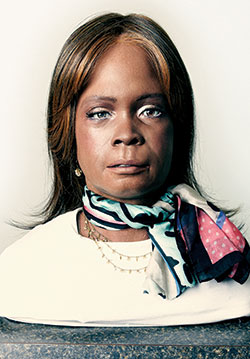 |
Bina48, a robot designed to push the limits of artificial intelligence and give Bina a kind of eternal life.
(Photo: Peter Hapak/New York Magazine) |
Soon they were living in the suburbs of Washington, in an apartment that was way too small. It was a hectic, happy time. The Rothblatts, now married, legally adopted each other’s children, and would soon have two more. Bina started her conversion to Judaism (her given name is actually Beverlee). In 1983, convinced that no one had quite yet realized the commercial possibilities of outer space, Martin left the big law firm that paid for his move cross-country and went out on his own, first launching Geostar, the pathbreaking car-navigation system, and then Sirius, the culmination, in a way, of his Seychelles vision. Martin imagined a world in which tiny satellite dishes might be attached to cars, allowing a driver to cover vast distances and never lose a radio signal. The traditional broadcasters saw Sirius as unwanted competition, but funded with millions from previous successes, Martin got improbable approval from the FCC. “She’s an outstanding conceptual salesperson,” says her friend and fellow futurist Ray Kurzweil. Martine has described her Sirius entrepreneurship more bluntly: “I was a tough-talking satellite engineer.”
Bina was as surprised as anyone when her husband told her, in the early ’90s, of his desire to become a woman, and Martine has said she delayed broaching the subject until she was certain Bina would not leave. “I love you for your soul, not your skin” is how Bina responded. “I was so lucky,” Martine reflects now. “So, so lucky.”
And so began the years of transition. There were hormones, of course, and endless hours of psychotherapy aimed at establishing that Martine’s urge was neither fleeting nor shallow. She began dressing as a woman in ever-widening circles—first out with Bina alone, then with friends, and finally on weekends with the kids and their friends. The children (I spoke to three out of four) agree it was an anguishing time. They were teased at school (“Who wears the pants in your family now?” ); neighbors moved away.
In the conventional narrative about sex reassignment, a person is so sure from such a young age that he or she inhabits the wrong body that a surgically corrected self is a lifelong dream. Martine says the idea was in her mind from the time she was about 15 years old. “I idealized myself in my mind as female,” she says, even using the word “gay,” “in the sense of seeing myself as a woman, sexually attracted to women.” But this female self-image didn’t drive or define her, and it didn’t exclude other visions of herself. (“I loved my penis,” she told Howard Stern in a 2007 interview.) Her female identity was also invisible to those around her, and not just to Bina. “There is absolutely nothing that would indicate that this was his tendency or preference, absolutely nothing,” Rosa Lee told me. “She isn’t a woman, and neither am I,” added Martine’s friend Kate Bornstein, one of the founders of the transgender movement, who saw a special courage in Martine’s disinclination to fully embrace either gender at a time, during the mid-’90s, when “gender queer” had not yet become a familiar term.
Gabriel Rothblatt, the third of Martine and Bina’s children, remembers the day, when he was 11 years old, that Martine told him about her imminent surgery; they were at the mall. Now 31, Gabriel is a father of four and running for Congress as a Democrat in Florida’s Eighth District, with a platform whose first item is “Space.”
“Will you still be my dad?” Gabriel asked.
“I’ll still be your dad,” Martine answered. “I’m not changing. I’m only changing physically. I’m going to be like a butterfly.”
As adults, the siblings have hashed over Martine’s choice, Gabriel says. If genitalia aren’t defining, then why put yourself and the people you love through such a painful process? Gabriel says he long ago made peace with Martine’s decision: “She did what she felt was right, the right choice for her.” But he also sees that it may have sprung as much from her lifelong determination to cross all borders as from a compulsion that was bred in the bone. “Sometimes it’s necessary to be a living example,” Gabriel told me. “If the point was just rhetorical, if this was just some philosophical scrabbling, the message wouldn’t have been as strong.” Then he brings up what he calls the familiar joke about why the libertarian chicken crossed the road. “The libertarian chicken dreams of the day when no one asks them why they crossed the road. It’s your body. It’s your choice what you choose to do with it. It’s not even our place or our business to be judging them or asking them why.”